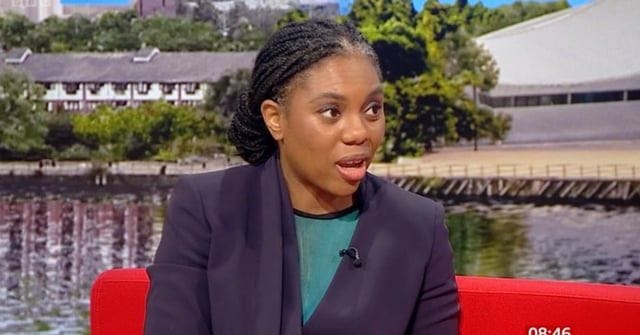UK Conservative Party leader, Kemi Badenoch, won't 'Netflix and Legislate.'
An odd 'glitch in the matrix' moment sees Badenoch grilled by journalists for not watching the Netflix series, 'Adolescence.' But should politicians use entertainment as a source of policy?

A politician not keeping up with the latest hit on Netflix is the literal equivalent of selling out the country. At least, that’s the situation in which Kemi Badenoch, leader of the Conservative Party of Britain, finds herself after admitting — shock! horror! — she hasn’t seen a fictional TV drama called ‘Adolescence.’
The show has taken the UK by storm, having been watched millions of times, ‘praised’ for tackling thorny social issues, and (strangely) even endorsed by Labour Prime Minister Keir Starmer, who called it essential viewing. Starmer went so far as to spend governmental resources in support of the show’s creators by hosting roundtables at 10 Downing Street, pushing for it to be shown in schools across the country.
Using public resources to promote fictional (woke?) entertainment as education comes on the heels of news that the UK government recently confirmed it holds information about influencing storylines in fictional television programming. In other words, your favorite ‘brit com’, soap opera, or TV drama is potentially an extension of the State apparatus for social control — also known as propaganda.
Netflix’s ‘Adolescence’ fits the bill perfectly. The four-part miniseries follows 13-year-old Jamie Miller, arrested for the murder of his classmate, Katie Leonard, in a northern English town. It digs into why Jamie snapped, probing themes like the toxic pull of the online “manosphere” and incel ideology, social media pressures, bullying, and warped expectations of masculinity. The series asks questions about kids navigating a digital cesspool and the adults who fail to steer them.
‘Adolescence’ has become a sort of cultural lightning rod, so when Badenoch told an interviewer, LBC’s Nick Ferrari, she hadn’t watched it, he reacted in shock and called it a “dereliction of duty.”
And he was serious.
She fired back, saying, “I pay attention, but I’m not going to watch every single thing people are watching on Netflix.” She argued the show touches on real societal problems, but that she’s got bigger fish to fry. Like crime. Or the economy. Or war. Or immigration.
Fair enough.
But, in a follow-up interview, BBC Breakfast hosts Naga Munchetty and Charlie Stayt were having none of it. Last week, they grilled Badenoch for over four excruciating minutes about her Netflix truancy. (Watch from 14:15 in the video above.)
“Everyone’s talking about it,” the hosts huffed, incredulous.
Badenoch held her ground. She said her time’s better spent talking to actual victims, parents, and communities about real-world harm, not dissecting a fictional drama.
My job is not to watch lots of TV. My job is to get out there and make sure that I'm talking about the issues that are happening in the country right now. And, yes, of course we should be talking about misogyny. The rape gang scandal is one of the most misogynistic incidents that has happened in our country. So me talking about that, me asking for a national inquiry, is doing my job.
Badenoch’s critics seized on her non-viewership of ‘Adolescence’ in an attempt to paint her as an out of touch leader, someone clueless about a cultural moment that’s got parents, teachers, and voters spooked. The media is attempting to frame her as detached from the fears fueling the show’s hype — fears about kids lost to knife crime or radicalized by toxic online corners like incel forums. It’s a political cheap shot, inflating a trivial snub into a referendum on her fitness to lead. The media’s all too happy to fan the flames, turning a shrug into a scandal.
The show’s creators say ‘Adolescence’ is about sparking conversation. In that sense, it’s not alone — many shows aim to tackle social issues. However, with the UK about to go to the polls for local elections, expecting the leader of a political party to be sitting at home watching TV is the height of lunacy.
Badenoch’s refusal to treat a fictional drama like a policy memo doesn’t alone make her unfit to lead, nor does her refusal to ‘Netflix and legislate.’ Instead, what has been laid bare for all to see is the overt bias and puerile understanding of the complexity of social issues by media.
The next time so-called journalists want a better understanding of how government works, they might consider watching Yes Minister.



Journalism has gone to the dogs. They watch too much TV I guess.
I can't comment on the content of the Netflix show but since it's fictional, and "entertainment" for the armchair critics, it's probably not useful as a source of policy.
It sounds to me like propaganda and indoctrination and the talking heads have swallowed that kool aid.
Excellent article on the madness of how politics and entertainment are entwined. Having watched Adolescence, I am puzzled by all the hype. It’s a drama about victims , is this the message they want us all to consume , especially the young ?